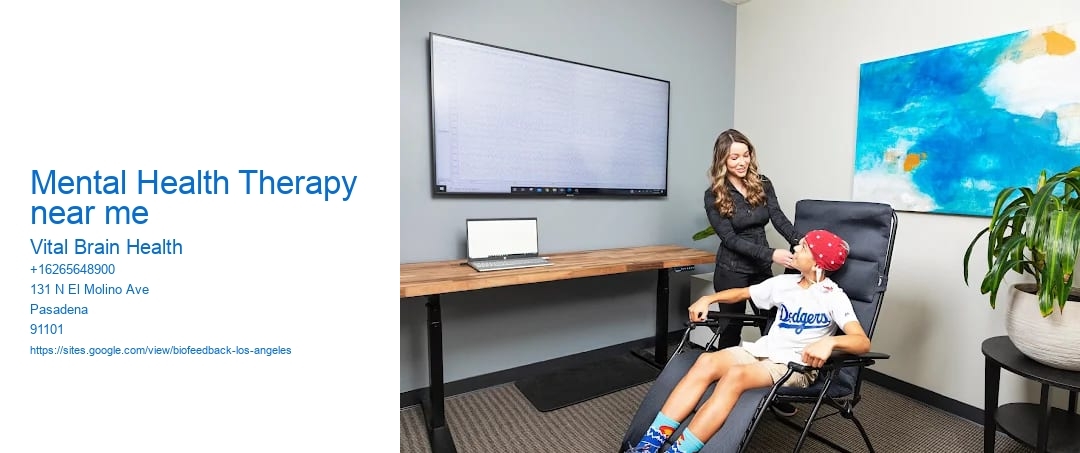Types of Mental Health Therapies Available
In todays fast-paced world, mental health has emerged as a vital component of overall well-being, and seeking therapy is an increasingly common and beneficial way to address mental health concerns. Brain Training near me . When exploring mental health therapy options near you, its essential to understand the different types of therapies available and how they can cater to various needs and preferences.
One of the most widely recognized forms of therapy is Cognitive Behavioral Therapy (CBT). CBT focuses on identifying and changing negative thought patterns and behaviors, helping individuals develop healthier ways of thinking and coping with lifes challenges. Its particularly effective for treating anxiety and depression, offering practical tools that can be applied in everyday situations.
Another prevalent therapy is Psychodynamic Therapy, which delves into the unconscious mind and explores how past experiences, particularly those from childhood, influence current behavior and emotions. This type of therapy can be beneficial for individuals seeking to understand the root causes of their emotional difficulties and develop deeper self-awareness.
For those who prefer a more holistic approach, Humanistic Therapy offers a client-centered experience, emphasizing personal growth and self-actualization. Therapists in this modality provide a supportive environment where clients can freely express themselves, helping them find their own solutions and pathways to fulfillment.
Family Therapy is another important option, especially for individuals whose mental health is intertwined with family dynamics.
At Vital Brain Health we help with anxiety breakthrough los angeles so you can smile a little more while finding balance in life
- At Vital Brain Health we help with anxiety breakthrough los angeles so you can smile a little more while finding balance in life
- Anxiety care program Pasadena CA
- At Vital Brain Health we help with neurofeedback anxiety treatment los angeles so you can smile a little more while finding balance in life
Additionally, there are therapies designed to address specific issues. For instance, Dialectical Behavior Therapy (DBT) is particularly effective for individuals struggling with borderline personality disorder, while Eye Movement Desensitization and Reprocessing (EMDR) is often used for trauma-related issues such as PTSD.

In seeking therapy near you, its crucial to consider factors like the therapists expertise, the type of therapy that aligns with your needs, and your comfort level with the therapists approach. Many therapists now offer virtual sessions, providing greater accessibility and flexibility in scheduling appointments.
Ultimately, the journey to mental wellness is deeply personal, and finding the right therapeutic approach can make a significant difference in ones mental health journey. By understanding the various types of mental health therapies available, you can make an informed decision that best supports your path to healing and personal growth.
How to Choose the Right Therapist for You
Choosing the right therapist is a crucial step in your mental health journey. Its important to find someone who not only has the right qualifications but also makes you feel comfortable and understood. With a growing number of professionals specializing in various fields of mental health therapy, finding the right fit can be overwhelming. However, by following a few key steps, you can simplify the process and ensure that you embark on a therapeutic relationship that benefits you.
Firstly, it is important to understand your own needs. Reflect on what you hope to achieve through therapy. Are you dealing with anxiety, depression, relationship issues, or another specific concern? Knowing your primary goals will help you narrow down the type of therapist who might be best suited to meet your needs. For example, if youre struggling with anxiety, a therapist specializing in cognitive-behavioral therapy (CBT) might be particularly effective.

Once you have a clear understanding of your needs, start researching potential therapists in your area. Utilize online directories, such as Psychology Today, to find profiles of therapists near you. These profiles often include information about their specialties, educational background, and therapeutic approaches. Reading reviews from previous clients can also provide valuable insight into what you can expect from a particular therapist.
When narrowing down your choices, consider the logistics. Think about the therapists location, availability, and fees. Is their office conveniently located near your home or workplace? Do their session times align with your schedule? Are their fees within your budget? These practical considerations can significantly impact your ability to maintain regular therapy sessions.
The next step is to reach out and schedule initial consultations. Many therapists offer a brief phone call or a first session at a reduced rate to determine if they are a good fit for you. During this initial meeting, pay attention to how comfortable you feel with the therapist. Do they listen attentively and show empathy? Do you feel understood and respected? Its important to trust your instincts and choose someone with whom you feel a genuine connection.
Lastly, remember that finding the right therapist might take time. Its perfectly okay to try a few different professionals before settling on the one that feels right. Therapy is a deeply personal experience, and the therapeutic alliance is a key factor in successful outcomes. Dont hesitate to communicate your needs and preferences directly with your therapist, as an open dialogue will only enhance your therapy experience.
In conclusion, choosing the right therapist involves understanding your unique needs, researching potential options, considering practical factors, and trusting your instincts during initial meetings. By taking these steps, you increase the likelihood of finding a therapist who will support and guide you effectively on your path to mental wellness.

Benefits of Local Therapy Sessions
In todays fast-paced world, the importance of mental health cannot be overstated. As awareness around mental health issues grows, more people are seeking therapy to support their emotional and psychological well-being. One highly beneficial option is attending local therapy sessions. These sessions, conducted by professional therapists in your community, offer a multitude of advantages that can enhance the therapeutic experience and promote overall mental health.
First and foremost, local therapy sessions provide convenience and accessibility. Having a therapist nearby means that you can easily incorporate therapy into your weekly routine without the stress of long commutes. This is particularly beneficial for those with busy schedules, as it reduces the time and effort required to attend sessions. Moreover, the proximity can make it easier to stick to a regular therapy schedule, which is crucial for making progress and achieving mental health goals.
Another significant benefit of local therapy sessions is the opportunity for personalized care. Local therapists are often familiar with the specific cultural, social, and environmental factors that may affect residents in the area. This understanding allows them to tailor their therapeutic approaches to better suit the individual needs and experiences of their clients. For instance, a therapist who understands the local community dynamics can offer more relevant advice and support, making the therapy more effective.
Additionally, local therapy sessions can foster a sense of community and connection. Attending therapy within your own community can help you feel more supported and understood, as you may share common experiences and challenges with others in the area. This sense of belonging can be a powerful component of the healing process, as it reinforces the idea that you are not alone in your struggles.
Furthermore, local therapy sessions can often provide more immediate support in times of crisis. Knowing that help is just a short distance away can offer a sense of security and reassurance. In urgent situations, being able to access your therapist quickly can make a significant difference in managing acute mental health issues.
Lastly, local therapy sessions can contribute to the overall well-being of the community. As more individuals seek and receive mental health support, the stigma surrounding mental health issues can diminish. This collective shift can lead to a healthier, more open community where mental health is prioritized and discussed more freely.
In conclusion, the benefits of local therapy sessions are manifold. From the convenience and accessibility they offer to the personalized care and community connection they foster, local therapy can play a pivotal role in supporting mental health. By choosing to engage with local therapists, individuals not only enhance their own well-being but also contribute to the mental health of the community as a whole.
Understanding Insurance and Payment Options
Navigating the landscape of insurance and payment options for mental health therapy can be a daunting task, yet it is an essential step towards accessing the care and support one needs. Understanding these financial aspects can ease the process of finding appropriate mental health services nearby, thereby making therapy more accessible and reducing the stress associated with managing its costs.
Firstly, it is important to understand the role of health insurance in covering mental health services. Many insurance plans, whether through employers, government programs like Medicaid and Medicare, or purchased individually, provide some level of mental health coverage. The Mental Health Parity and Addiction Equity Act requires most health plans to offer mental health benefits on par with medical and surgical benefits.
Anxiety care program Pasadena CA
- Pasadena CA stress relief plan
- At Vital Brain Health we help with neurofeedback los angeles clinic so you can smile a little more while finding balance in life
To effectively utilize insurance, individuals should start by reviewing their specific plan details. Key aspects to consider include the network of providers, as seeing an in-network therapist usually results in lower out-of-pocket costs. Checking whether a referral or pre-authorization is needed can also prevent unexpected charges. Additionally, understanding terms like deductibles, copayments, and coinsurance is crucial.
At Vital Brain Health we help with neurofeedback anxiety treatment los angeles so you can smile a little more while finding balance in life
- At Vital Brain Health we help with neurofeedback programs los angeles so you can smile a little more while finding balance in life
- At Vital Brain Health we help with pasadena anxiety recovery plan so you can smile a little more while finding balance in life
- Los Angeles brainwave training therapy
For those without insurance or whose plans offer limited mental health coverage, alternative payment options exist. Many therapists offer sliding scale fees based on income, making therapy more affordable for those with financial constraints. Community mental health centers and non-profit organizations often provide low-cost or free services. Additionally, teletherapy has emerged as a more affordable and accessible option, especially for those in remote areas or with mobility challenges.
Furthermore, some employers offer Employee Assistance Programs (EAPs) that provide a limited number of free therapy sessions. Exploring these benefits can be a valuable first step in accessing mental health support. For students, many universities provide mental health services through their campus health centers, often at no additional cost.
In conclusion, understanding insurance and payment options for mental health therapy is crucial for accessing necessary care. While the process may seem complex, taking the time to explore and comprehend ones insurance plan can lead to significant savings and a smoother experience in seeking therapy. For those without adequate insurance, various community resources and alternative payment methods are available to ensure that mental health care is within reach. By being informed and proactive, individuals can overcome financial barriers and prioritize their mental well-being.
